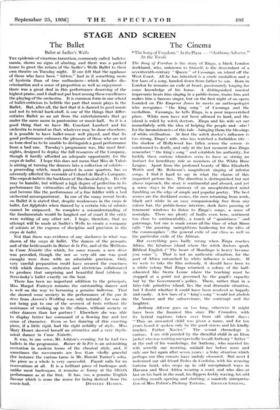Ballet at Sadler's Wells
STAGE AND SCREEN The Ballet
Tim epidemic of vicarious tarantism, commonly called balleto- mania, shows no signs of abating, and there was a packed house to greet the return of the Sadler's Wells Ballet to their own theatre on Tuesday night. If one felt that the applause of those who have been " bitten," had in it something more of hysteria than of true enthusiasm—which includes dis- crimination and a sense of proportion as well as enjoyment— there was a great deal in this performance deserving of the highest praise, and I shall not put least among these excellences the playing of the orchestra. It is common form in one school of ballet-criticism to belittle the part that music plays in the Ballet. But, after all, the fact that it is danced to good music and not to trivial hack-stuff, is one of the things that differ- entiates Ballet as an art from the entertainments that go under the same name in pantomime or music-hall. So it is a good thing that we have Mr. Constant Lambert and his orchestra to rewind us that, whatever may be done elsewhere, it is possible to have ballet-music well played, and that its good performance enhances the pleasure of those who are not so tone-deaf as to be unable to distinguish a good performance from a bad one. Tuesday's programme was, like most first- nights, designed to deploy the full resources of the Company, though it hardly afforded an adequate opportunity for the corps de ballet. I hope this does not mean that Miss de Valois is aiming at turning the dancers into a collection of soloists— a proceeding which, much praised in some quarters, has so adversely affected the ensemble of Colonel de Basil's Company. The corps de ballet is the backbone of the classical style. Its role may be humble, but without a high degree of perfection in its performance the virtuosities of the ballerina have no setting and become like the performance of a fine fiddler with a bad orchestral accompaniment. In one of the many recent books on Ballet it is stated that, despite weaknesses in the corps de ballet, Les Sylphides when danced by a certain trio of soloists cannot be surpassed. So complete a misunderstanding of the fundamentals would be laughed out of court if the critic were writing of any other art. I hope, therefore, that no attempt will be made at Sadler's Wells to create a company of soloists at the expense of discipline and precision in the corps de ballet.
Not that there was evidence of any slackness in what was shown of the corps de ballet. The dances of the peasants and of the bridesmaids in Baiser de la Fee, and of the Mirlitons in Came Noisette (for which, for some reason, a new decor was provided, though the not so very old one was good enough) were done with an admirable precision. Only very careful preparation could have secured the exactness with which dancers, orchestra and electrician collaborated to produce that surprising and beautiful final tableau in Stravinsky's ballet exactly on the beat.
There has- been no important addition to the principals. Miss Margot Fonteyn remains the outstanding dancer and is well on the way to becoming a genuine ballerina. That she showed some anxiety in the performance of the pas de deux from Aurora's Wedding was only natural ; for was she not being put to one of the severest of tests without the assistance of working up to the climax, without scenery or other dancers than her partner ? Elsewhere she was able to display better her command of a flowing line and her sense of character. Even so her dancing of this exacting piece, if a little rigid, had the right nobility of style. Miss Mary Honer showed herself an attractive and a very rhyth- mical dancer in Came Noisette.
It was, in one sense, Mr. Ashton's evening, for he had two ballets in the programme. Baiser de la Fee is an astonishing recreation in modern terms of the classical style, and, if sometimes the movements are less than wholly graceful (for instance the curious turns in Mr. Harold Turner's solo), the piece as a whole is very successful. Façade calls for no reservations at all. It is .a brilliant- piece of burlesque and, unlike most burlesques, it, remains funny at the fiftieth performance as at -the first. It has, too, a genuine English flavour which is none the worse for being derived from the


















































 Previous page
Previous page